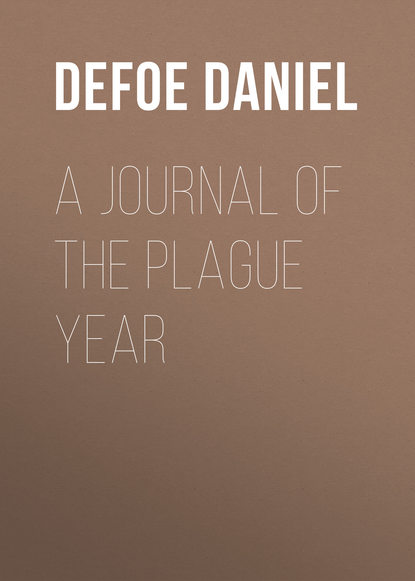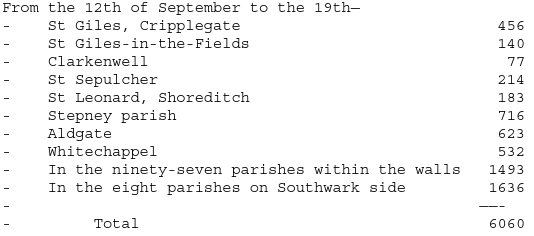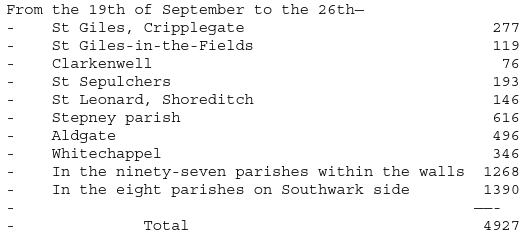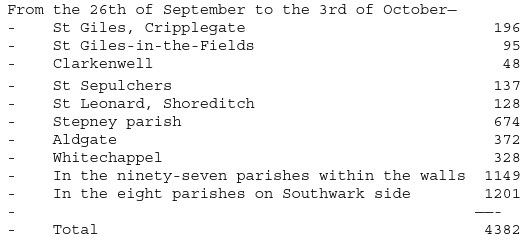 Полная версия
Полная версияПолная версия:
A Journal of the Plague Year
By this means bread was always to be had in plenty, and as cheap as usual, as I said above; and provisions were never wanting in the markets, even to such a degree that I often wondered at it, and reproached myself with being so timorous and cautious in stirring abroad, when the country people came freely and boldly to market, as if there had been no manner of infection in the city, or danger of catching it.
It was indeed one admirable piece of conduct in the said magistrates that the streets were kept constantly clear and free from all manner of frightful objects, dead bodies, or any such things as were indecent or unpleasant – unless where anybody fell down suddenly or died in the streets, as I have said above; and these were generally covered with some cloth or blanket, or removed into the next churchyard till night. All the needful works that carried terror with them, that were both dismal and dangerous, were done in the night; if any diseased bodies were removed, or dead bodies buried, or infected clothes burnt, it was done in the night; and all the bodies which were thrown into the great pits in the several churchyards or burying-grounds, as has been observed, were so removed in the night, and everything was covered and closed before day. So that in the daytime there was not the least signal of the calamity to be seen or heard of, except what was to be observed from the emptiness of the streets, and sometimes from the passionate outcries and lamentations of the people, out at their windows, and from the numbers of houses and shops shut up.
Nor was the silence and emptiness of the streets so much in the city as in the out-parts, except just at one particular time when, as I have mentioned, the plague came east and spread over all the city. It was indeed a merciful disposition of God, that as the plague began at one end of the town first (as has been observed at large) so it proceeded progressively to other parts, and did not come on this way, or eastward, till it had spent its fury in the West part of the town; and so, as it came on one way, it abated another. For example, it began at St Giles's and the Westminster end of the town, and it was in its height in all that part by about the middle of July, viz., in St Giles-in-the-Fields, St Andrew's, Holborn, St Clement Danes, St Martin-in-the-Fields, and in Westminster. The latter end of July it decreased in those parishes; and coming east, it increased prodigiously in Cripplegate, St Sepulcher's, St James's, Clarkenwell, and St Bride's and Aldersgate. While it was in all these parishes, the city and all the parishes of the Southwark side of the water and all Stepney, Whitechappel, Aldgate, Wapping, and Ratcliff, were very little touched; so that people went about their business unconcerned, carried on their trades, kept open their shops, and conversed freely with one another in all the city, the east and north-east suburbs, and in Southwark, almost as if the plague had not been among us.
Even when the north and north-west suburbs were fully infected, viz., Cripplegate, Clarkenwell, Bishopsgate, and Shoreditch, yet still all the rest were tolerably well. For example from 25th July to 1st August the bill stood thus of all diseases: —

So that, in short, there died more that week in the two parishes of Cripplegate and St Sepulcher by forty-eight than in all the city, all the east suburbs, and all the Southwark parishes put together. This caused the reputation of the city's health to continue all over England – and especially in the counties and markets adjacent, from whence our supply of provisions chiefly came even much longer than that health itself continued; for when the people came into the streets from the country by Shoreditch and Bishopsgate, or by Old Street and Smithfield, they would see the out-streets empty and the houses and shops shut, and the few people that were stirring there walk in the middle of the streets. But when they came within the city, there things looked better, and the markets and shops were open, and the people walking about the streets as usual, though not quite so many; and this continued till the latter end of August and the beginning of September.
But then the case altered quite; the distemper abated in the west and north-west parishes, and the weight of the infection lay on the city and the eastern suburbs, and the Southwark side, and this in a frightful manner. Then, indeed, the city began to look dismal, shops to be shut, and the streets desolate. In the High Street, indeed, necessity made people stir abroad on many occasions; and there would be in the middle of the day a pretty many people, but in the mornings and evenings scarce any to be seen, even there, no, not in Cornhill and Cheapside.
These observations of mine were abundantly confirmed by the weekly bills of mortality for those weeks, an abstract of which, as they respect the parishes which. I have mentioned and as they make the calculations I speak of very evident, take as follows.
The weekly bill, which makes out this decrease of the burials in the west and north side of the city, stands thus —

Here is a strange change of things indeed, and a sad change it was; and had it held for two months more than it did, very few people would have been left alive. But then such, I say, was the merciful disposition of God that, when it was thus, the west and north part which had been so dreadfully visited at first, grew, as you see, much better; and as the people disappeared here, they began to look abroad again there; and the next week or two altered it still more; that is, more to the encouragement of the other part of the town. For example: —


And now the misery of the city and of the said east and south parts was complete indeed; for, as you see, the weight of the distemper lay upon those parts, that is to say, the city, the eight parishes over the river, with the parishes of Aldgate, Whitechappel, and Stepney; and this was the time that the bills came up to such a monstrous height as that I mentioned before, and that eight or nine, and, as I believe, ten or twelve thousand a week, died; for it is my settled opinion that they never could come at any just account of the numbers, for the reasons which I have given already.
Nay, one of the most eminent physicians, who has since published in Latin an account of those times, and of his observations says that in one week there died twelve thousand people, and that particularly there died four thousand in one night; though I do not remember that there ever was any such particular night so remarkably fatal as that such a number died in it. However, all this confirms what I have said above of the uncertainty of the bills of mortality, &c., of which I shall say more hereafter.
And here let me take leave to enter again, though it may seem a repetition of circumstances, into a description of the miserable condition of the city itself, and of those parts where I lived at this particular time. The city and those other parts, notwithstanding the great numbers of people that were gone into the country, was vastly full of people; and perhaps the fuller because people had for a long time a strong belief that the plague would not come into the city, nor into Southwark, no, nor into Wapping or Ratcliff at all; nay, such was the assurance of the people on that head that many removed from the suburbs on the west and north sides, into those eastern and south sides as for safety; and, as I verily believe, carried the plague amongst them there perhaps sooner than they would otherwise have had it.
Here also I ought to leave a further remark for the use of posterity, concerning the manner of people's infecting one another; namely, that it was not the sick people only from whom the plague was immediately received by others that were sound, but the well. To explain myself: by the sick people I mean those who were known to be sick, had taken their beds, had been under cure, or had swellings and tumours upon them, and the like; these everybody could beware of; they were either in their beds or in such condition as could not be concealed.
By the well I mean such as had received the contagion, and had it really upon them, and in their blood, yet did not show the consequences of it in their countenances: nay, even were not sensible of it themselves, as many were not for several days. These breathed death in every place, and upon everybody who came near them; nay, their very clothes retained the infection, their hands would infect the things they touched, especially if they were warm and sweaty, and they were generally apt to sweat too.
Now it was impossible to know these people, nor did they sometimes, as I have said, know themselves to be infected. These were the people that so often dropped down and fainted in the streets; for oftentimes they would go about the streets to the last, till on a sudden they would sweat, grow faint, sit down at a door and die. It is true, finding themselves thus, they would struggle hard to get home to their own doors, or at other times would be just able to go into their houses and die instantly; other times they would go about till they had the very tokens come out upon them, and yet not know it, and would die in an hour or two after they came home, but be well as long as they were abroad. These were the dangerous people; these were the people of whom the well people ought to have been afraid; but then, on the other side, it was impossible to know them.
And this is the reason why it is impossible in a visitation to prevent the spreading of the plague by the utmost human vigilance: viz., that it is impossible to know the infected people from the sound, or that the infected people should perfectly know themselves. I knew a man who conversed freely in London all the season of the plague in 1665, and kept about him an antidote or cordial on purpose to take when he thought himself in any danger, and he had such a rule to know or have warning of the danger by as indeed I never met with before or since. How far it may be depended on I know not. He had a wound in his leg, and whenever he came among any people that were not sound, and the infection began to affect him, he said he could know it by that signal, viz., that his wound in his leg would smart, and look pale and white; so as soon as ever he felt it smart it was time for him to withdraw, or to take care of himself, taking his drink, which he always carried about him for that purpose. Now it seems he found his wound would smart many times when he was in company with such who thought themselves to be sound, and who appeared so to one another; but he would presently rise up and say publicly, 'Friends, here is somebody in the room that has the plague', and so would immediately break up the company. This was indeed a faithful monitor to all people that the plague is not to be avoided by those that converse promiscuously in a town infected, and people have it when they know it not, and that they likewise give it to others when they know not that they have it themselves; and in this case shutting up the well or removing the sick will not do it, unless they can go back and shut up all those that the sick had conversed with, even before they knew themselves to be sick, and none knows how far to carry that back, or where to stop; for none knows when or where or how they may have received the infection, or from whom.
This I take to be the reason which makes so many people talk of the air being corrupted and infected, and that they need not be cautious of whom they converse with, for that the contagion was in the air. I have seen them in strange agitations and surprises on this account. 'I have never come near any infected body', says the disturbed person; 'I have conversed with none but sound, healthy people, and yet I have gotten the distemper!' 'I am sure I am struck from Heaven', says another, and he falls to the serious part. Again, the first goes on exclaiming, 'I have come near no infection or any infected person; I am sure it is the air. We draw in death when we breathe, and therefore 'tis the hand of God; there is no withstanding it.' And this at last made many people, being hardened to the danger, grow less concerned at it; and less cautious towards the latter end of the time, and when it was come to its height, than they were at first. Then, with a kind of a Turkish predestinarianism, they would say, if it pleased God to strike them, it was all one whether they went abroad or stayed at home; they could not escape it, and therefore they went boldly about, even into infected houses and infected company; visited sick people; and, in short, lay in the beds with their wives or relations when they were infected. And what was the consequence, but the same that is the consequence in Turkey, and in those countries where they do those things – namely, that they were infected too, and died by hundreds and thousands?
I would be far from lessening the awe of the judgements of God and the reverence to His providence which ought always to be on our minds on such occasions as these. Doubtless the visitation itself is a stroke from Heaven upon a city, or country, or nation where it falls; a messenger of His vengeance, and a loud call to that nation or country or city to humiliation and repentance, according to that of the prophet Jeremiah (xviii. 7, 8): 'At what instant I shall speak concerning a nation, and concerning a kingdom, to pluck up, and to pull down, and to destroy it; if that nation against whom I have pronounced turn from their evil, I will repent of the evil that I thought to do unto them.' Now to prompt due impressions of the awe of God on the minds of men on such occasions, and not to lessen them, it is that I have left those minutes upon record.
I say, therefore, I reflect upon no man for putting the reason of those things upon the immediate hand of God, and the appointment and direction of His providence; nay, on the contrary, there were many wonderful deliverances of persons from infection, and deliverances of persons when infected, which intimate singular and remarkable providence in the particular instances to which they refer; and I esteem my own deliverance to be one next to miraculous, and do record it with thankfulness.
But when I am speaking of the plague as a distemper arising from natural causes, we must consider it as it was really propagated by natural means; nor is it at all the less a judgement for its being under the conduct of human causes and effects; for, as the Divine Power has formed the whole scheme of nature and maintains nature in its course, so the same Power thinks fit to let His own actings with men, whether of mercy or judgement, to go on in the ordinary course of natural causes; and He is pleased to act by those natural causes as the ordinary means, excepting and reserving to Himself nevertheless a power to act in a supernatural way when He sees occasion. Now 'tis evident that in the case of an infection there is no apparent extraordinary occasion for supernatural operation, but the ordinary course of things appears sufficiently armed, and made capable of all the effects that Heaven usually directs by a contagion. Among these causes and effects, this of the secret conveyance of infection, imperceptible and unavoidable, is more than sufficient to execute the fierceness of Divine vengeance, without putting it upon supernaturals and miracle.
The acute penetrating nature of the disease itself was such, and the infection was received so imperceptibly, that the most exact caution could not secure us while in the place. But I must be allowed to believe – and I have so many examples fresh in my memory to convince me of it, that I think none can resist their evidence – I say, I must be allowed to believe that no one in this whole nation ever received the sickness or infection but who received it in the ordinary way of infection from somebody, or the clothes or touch or stench of somebody that was infected before.
The manner of its coming first to London proves this also, viz., by goods brought over from Holland, and brought thither from the Levant; the first breaking of it out in a house in Long Acre where those goods were carried and first opened; its spreading from that house to other houses by the visible unwary conversing with those who were sick; and the infecting the parish officers who were employed about the persons dead, and the like. These are known authorities for this great foundation point – that it went on and proceeded from person to person and from house to house, and no otherwise. In the first house that was infected there died four persons. A neighbour, hearing the mistress of the first house was sick, went to visit her, and went home and gave the distemper to her family, and died, and all her household. A minister, called to pray with the first sick person in the second house, was said to sicken immediately and die with several more in his house. Then the physicians began to consider, for they did not at first dream of a general contagion. But the physicians being sent to inspect the bodies, they assured the people that it was neither more or less than the plague, with all its terrifying particulars, and that it threatened an universal infection, so many people having already conversed with the sick or distempered, and having, as might be supposed, received infection from them, that it would be impossible to put a stop to it.
Here the opinion of the physicians agreed with my observation afterwards, namely, that the danger was spreading insensibly, for the sick could infect none but those that came within reach of the sick person; but that one man who may have really received the infection and knows it not, but goes abroad and about as a sound person, may give the plague to a thousand people, and they to greater numbers in proportion, and neither the person giving the infection or the persons receiving it know anything of it, and perhaps not feel the effects of it for several days after.
For example, many persons in the time of this visitation never perceived that they were infected till they found to their unspeakable surprise, the tokens come out upon them; after which they seldom lived six hours; for those spots they called the tokens were really gangrene spots, or mortified flesh in small knobs as broad as a little silver penny, and hard as a piece of callus or horn; so that, when the disease was come up to that length, there was nothing could follow but certain death; and yet, as I said, they knew nothing of their being infected, nor found themselves so much as out of order, till those mortal marks were upon them. But everybody must allow that they were infected in a high degree before, and must have been so some time, and consequently their breath, their sweat, their very clothes, were contagious for many days before. This occasioned a vast variety of cases which physicians would have much more opportunity to remember than I; but some came within the compass of my observation or hearing, of which I shall name a few.
A certain citizen who had lived safe and untouched till the month of September, when the weight of the distemper lay more in the city than it had done before, was mighty cheerful, and something too bold (as I think it was) in his talk of how secure he was, how cautious he had been, and how he had never come near any sick body. Says another citizen, a neighbour of his, to him one day, 'Do not be too confident, Mr – ; it is hard to say who is sick and who is well, for we see men alive and well to outward appearance one hour, and dead the next.' 'That is true', says the first man, for he was not a man presumptuously secure, but had escaped a long while – and men, as I said above, especially in the city began to be over-easy upon that score. 'That is true,' says he; 'I do not think myself secure, but I hope I have not been in company with any person that there has been any danger in.' 'No?' says his neighbour. 'Was not you at the Bull Head Tavern in Gracechurch Street with Mr – the night before last?' 'Yes,' says the first, 'I was; but there was nobody there that we had any reason to think dangerous.' Upon which his neighbour said no more, being unwilling to surprise him; but this made him more inquisitive, and as his neighbour appeared backward, he was the more impatient, and in a kind of warmth says he aloud, 'Why, he is not dead, is he?' Upon which his neighbour still was silent, but cast up his eyes and said something to himself; at which the first citizen turned pale, and said no more but this, 'Then I am a dead man too', and went home immediately and sent for a neighbouring apothecary to give him something preventive, for he had not yet found himself ill; but the apothecary, opening his breast, fetched a sigh, and said no more but this, 'Look up to God'; and the man died in a few hours.
Now let any man judge from a case like this if it is possible for the regulations of magistrates, either by shutting up the sick or removing them, to stop an infection which spreads itself from man to man even while they are perfectly well and insensible of its approach, and may be so for many days.
It may be proper to ask here how long it may be supposed men might have the seeds of the contagion in them before it discovered itself in this fatal manner, and how long they might go about seemingly whole, and yet be contagious to all those that came near them. I believe the most experienced physicians cannot answer this question directly any more than I can; and something an ordinary observer may take notice of, which may pass their observations. The opinion of physicians abroad seems to be that it may lie dormant in the spirits or in the blood-vessels a very considerable time. Why else do they exact a quarantine of those who came into their harbours and ports from suspected places? Forty days is, one would think, too long for nature to struggle with such an enemy as this, and not conquer it or yield to it. But I could not think, by my own observation, that they can be infected so as to be contagious to others above fifteen or sixteen days at furthest; and on that score it was, that when a house was shut up in the city and any one had died of the plague, but nobody appeared to be ill in the family for sixteen or eighteen days after, they were not so strict but that they would connive at their going privately abroad; nor would people be much afraid of them afterward, but rather think they were fortified the better, having not been vulnerable when the enemy was in their own house; but we sometimes found it had lain much longer concealed.
Upon the foot of all these observations I must say that though Providence seemed to direct my conduct to be otherwise, yet it is my opinion, and I must leave it as a prescription, viz., that the best physic against the plague is to run away from it. I know people encourage themselves by saying God is able to keep us in the midst of danger, and able to overtake us when we think ourselves out of danger; and this kept thousands in the town whose carcases went into the great pits by cartloads, and who, if they had fled from the danger, had, I believe, been safe from the disaster; at least 'tis probable they had been safe.
And were this very fundamental only duly considered by the people on any future occasion of this or the like nature, I am persuaded it would put them upon quite different measures for managing the people from those that they took in 1665, or than any that have been taken abroad that I have heard of. In a word, they would consider of separating the people into smaller bodies, and removing them in time farther from one another – and not let such a contagion as this, which is indeed chiefly dangerous to collected bodies of people, find a million of people in a body together, as was very near the case before, and would certainly be the case if it should ever appear again.
The plague, like a great fire, if a few houses only are contiguous where it happens, can only burn a few houses; or if it begins in a single, or, as we call it, a lone house, can only burn that lone house where it begins. But if it begins in a close-built town or city and gets a head, there its fury increases: it rages over the whole place, and consumes all it can reach.



